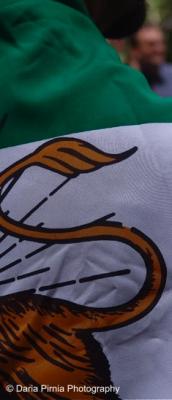
The good news is that there are increasingly louder calls for democracy in Iran. The question is who should lead this democracy movement in the country?
Of course, the opposition groups abroad—such as, the Mojahedin (MEK), Saltanat Talab monarchists, the Tudeh Party, etc. — would like to believe that they are the ones who after thirty years of impatiently waiting, now finally have a chance to go back and rule. They have lived in foreign lands and witnessed the Western democracy in action, and have access to foreign capital as well as free media which can be beamed to Iran—so they are the ones, they hope, who are best positioned to win power after the Akhoonda. In my opinion, none of them are fit for this purpose, and their possible take over of the power in Iran, if it ever happens, will betray the very idea of a healthy democracy.
The reason is simple: it is the Iranians in Iran who are in need of a full-fledged democratic system and none of the traditional opposition parties outside Iran enjoys sufficient support of the Iranians inside Iran.
MEK constitute today nothing more than a fractured and weakened party. Their application of violence as a political means has alienated the international community as well as most Iranians who are supporters of peaceful reforms. Their reliance on Saddam Husein under the Iran-Iraq War is seen as a disloyalty to the Iran’s national interests. Their revelations in 2007, of the Iranian nuclear facilities will not helped them in a possible power takeover in Iran either. The revelations may actually help Iran in the long run by preventing the IR from acquiring WMD (and so save Iran from much international trouble in the long-term). Yet for the large group of Iranians who favor the development of nuclear capability the revelations will stand as a signature of betrayal. It is unlikely that the MEK can ever win enough popular support to seize the power in Iran democratically.
Saltanat Talabans’ strength lies neither in their political ideology nor in their economic program, but in their distinctive culture which appeals to those Iranians who consider themselves of a higher class or a more prosperous background; thus leaving out the vast majority of average Iranians. In fact, the Saltanat Talabans’ culture is permeated with supremacist symbols, codes, and the notions of Aryan-ness and Ancient Persian Empire. These symbols are used as tools for political unification. Unfortunately, the notion of Aryan-ness has as a by-product the unintended effect of racially classifying the people of the world in categories of Aryans and non-Aryans, which is highly objectionable in today’s cosmopolitan world. This may also alienate some ethnic Iranians.
One of the weaknesses of the party’s leadership is Reza Pahlavi’s inexperience and lack of proper ties to the Iranian society. He left Iran as a teenager and has never been back to the country. He may be a shrewd guy but he has neither ever worked in Iran, nor ever had meaningful relationships with the average Iranians inside Iran on a professional basis. Reza Pahlavi has simply never been integrated in the Iranian political system and cannot represent the will of the Iranians who live in Iran.
At the root of the Saltanat Talabans’ political ideology lies a contradiction: they claim to be a progressive force, but they want to go forward by going back to a monarchy system. It makes no sense to install a Shah in Iran. Of course, many democratic countries, such as England and Norway, are based on a monarchy system. But their system has always been there and a change will require efforts and costs. If a system is already rid of the monarchy, there is little point for it to go back. One repairs a shabby bridge to save costs. But if the bridge is already fallen, it does not make sense to put the shabby debris back together and then repair them; one builds a whole new bridge. To restore the monarchy in Iran is especially problematic because due to lack of solid democratic experience in Iran a possible new Shah may be awarded more executive power than the European monarchs.
Ask for the leftist parties, not only they are out of fashion on a global basis, but the IR effectively eliminated them as a political force.
Only Iranians in Iran have to steer their path to democracy. They are making sacrifices for their cause, and only they know how best to promote their democratic aspirations. Of course, we can act as cheer leaders and render them moral support, but what makes one believe that after thirty years of a life in Western luxury, one can go back and run Iran?






